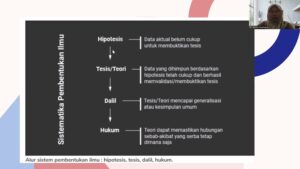 Barlah Rumhayati, S.Si., M.Si., Ph.D., Head of the PhD Chemistry Study Program, Department of Chemistry, Faculty of Mathematics and Natural Sciences, Brawijaya University, gave a lecture on Philosophy of Science and Bioethics for Master of Biology students, Department of Biology, FMIPA, University of Jember, on October 9 and 16, 2023. At the beginning of the lecture material, Dr. Barlah explained the meaning of the philosophy of science. “The philosophy of science is a branch of philosophy that studies and systematically questions the nature of scientific knowledge,” she explained. This scientific knowledge relates to philosophical and fundamental issues to achieve scientific knowledge.
Barlah Rumhayati, S.Si., M.Si., Ph.D., Head of the PhD Chemistry Study Program, Department of Chemistry, Faculty of Mathematics and Natural Sciences, Brawijaya University, gave a lecture on Philosophy of Science and Bioethics for Master of Biology students, Department of Biology, FMIPA, University of Jember, on October 9 and 16, 2023. At the beginning of the lecture material, Dr. Barlah explained the meaning of the philosophy of science. “The philosophy of science is a branch of philosophy that studies and systematically questions the nature of scientific knowledge,” she explained. This scientific knowledge relates to philosophical and fundamental issues to achieve scientific knowledge.
Guided by Master of Biology FMIPA UNEJ Lecturer Purwatiningsih, S.Si, M.Si., Ph.D. collaborative teaching is held online. Dr. Barlah also gave the example that when preparing a thesis, master’s students must be systematic or sequential. “In preparing a thesis based on a problem, the solution or answer to the problem must be philosophical, systematic, and fundamental,” she continued. Also, when preparing the conceptual framework of a thesis, it must be philosophical and fundamental to the issues raised or discussed.
The contents of the philosophy of science were also presented, firstly the nature of science, which is the topic of research that will later be outlined in the thesis. “Next are the aims and methods of science itself, as well as the parts of science and the scope of science,” said Dr. Barlah. The philosophy of science also contains the relationship between science and other life problems or philosophies such as values, ethics, morals, and human welfare.
Furthermore, the lecture explains the systematics of knowledge formation. Starting with a hypothesis, which must be carried out because the actual data is not enough to prove the thesis. “Very often, master’s students turn to making research and conclusions first rather than hypotheses, with the reason that it would be a mistake in preparing their thesis,” Dr. Barlah reminded me. Next is a thesis or theory that is based on a sufficient hypothesis so that it can validate or prove a thesis.
If the thesis or theory can be generalized, the next stage is the proposition. “The postulates that have been obtained will form a law, which states that the theory can ensure permanent cause and effect relationships anywhere,” she continued. On this occasion, knowledge was discussed. Knowledge that comes from English, namely knowledge, in the encyclopedia of philosophy is a great belief.
Meanwhile, in terms of terminology, knowledge is what is known or the result of the work of knowing. “The work of knowing is the result of knowing, being aware, understanding, and being clever. So according to Gazalba, knowledge is the result of the human process of knowing,” concluded Dr. Barlah, a chemistry lecturer with Analytical and Environmental Chemistry. The lecture was continued with questions and answers from Master of Biology students who attended the online session.




